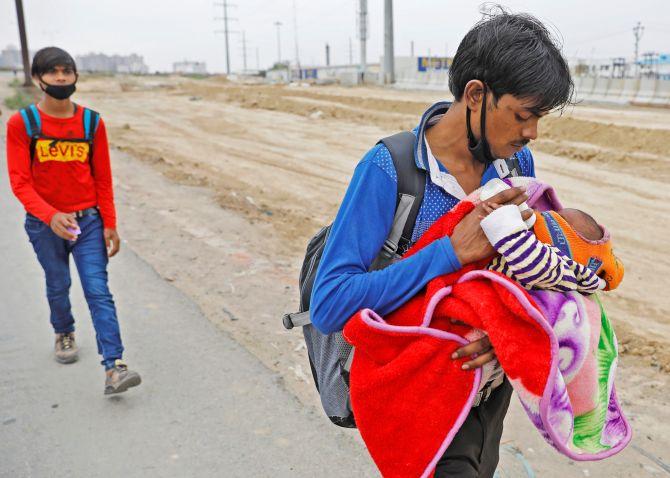What might be useful is targeted assistance to those sectors and individuals that are disproportionately affected, suggests Mihir S Sharma.

One of the most mystifying assumptions in today's world -- one made not just by 'ordinary' people, but by economists, politicians, and many of those who should know better -- is that governments can fix anything that happens to the economy.
This assumption is no less pervasive for being largely unspoken.
And it is what lies behind many of the calls for an 'economic response' to Covid-19, the disease being caused by the Wuhan-originating coronavirus.
Covid-19 is a serious disease.
It is an extraordinary challenge to global public health, even though it is not the superbug of our nightmares -- it is estimated, for example, that it is less than a third as contagious as chickenpox; measles is perhaps as much as six times as contagious.
MERS and SARS, the two previous animal-to-human coronaviruses this century, were considerably more deadly; MERS, discovered in Saudi Arabia in 2012, killed almost a third of patients. (Both have had more localised outbreaks, and MERS in particular is less contagious than Covid-19.)
But the fact is that Covid-19 is more than contagious and deadly enough to be the first truly globalised public health crisis in decades.
Any such crisis will have consequences.
The most obvious way to manage Covid-19 at a community level, according to experts, now that it is loose and before a vaccine is developed, is greater 'social distancing'.
At worst, this might ensure that not too many develop the symptoms at the same time, and allow the health care system to better deal with the intake of new patients.
What does social distancing mean? Essentially, people will need to stay away from other people.
But the world economy is not run from people's homes.
Social distancing -- working from home, reducing travel, reducing large group interaction, and so on -- will naturally reduce output where it is implemented.
If there is an outbreak in an area that is a hub for global supply chains, such as southern China, then that reduction in output will cascade through the global economy.
Some sectors -- aviation, for example -- will be disproportionately affected.
Here is where the hidden assumption about government action comes in.
If output has decreased, this assumption suggests, then government must do something to restore it to its 'natural' level.
Expansive fiscal or monetary policy is essential, according to this line of thinking.
This is just silly.
A pandemic like Covid-19 is not creating excess capacity in the economy which can respond to government stimulus.
The recommended public health measures in fact actually reduce potential output (for however long they are in effect).
This is not to say, for example, that some central banks need not take action.
Most importantly, the Covid-19 shock should not freeze up financial markets.
The European Central Bank, for example, has said it will ensure that banks have the liquidity they need to keep lending.
The US Federal Reserve has also infused $1.5 trillion of liquidity, but it also made a surprise cut to interest rates by 50 basis points.
It is not clear to anyone what the latter is supposed to achieve; the stock market, certainly, did not appear to be notably more enthusiastic after the cut than before.
Nor can increased government spending, in and of itself, help.
A generalised fiscal stimulus is intended to get people to up spending.
This is not what we want at this time -- especially if 'spending' is inversely correlated with social distance.
What might be useful instead is targeted assistance to those sectors and individuals that are disproportionately affected.
South Korea -- a country that was affected early on and which has had an exemplary response on most levels -- put into place an emergency child care subsidy and support for specific smaller enterprises.
The International Monetary Fund has recommended a set of such temporary transfers and tax relief.
The purpose here is not to 'make up' for or counteract the effects of the coronavirus; it is to ensure that the damage to the economy is not lasting, and that individuals and viable businesses have resources to survive an unknowably long period of lower potential output and sector-specific stress.
It is unfortunate that Finance Minister Nirmala Sitharaman, who largely resisted calls for a generalised stimulus in the Union Budget, said in reference to a stimulus on Friday that the government is 'moving on that front'.
This will raise expectations of a generalised demand stimulus that should not be raised.
Hopefully whatever measures are taken, when they are taken, will not be directed towards raising overall economy activity but will merely provide some temporary sustenance to imperilled sectors.
Covid-19 is not like the 2008 global financial crisis.
It is a crisis of a very different sort.
You can't spend your way out of it.
There are other things the government should do -- working on real preparedness of India's under-resourced health sector -- and it should focus on those.











